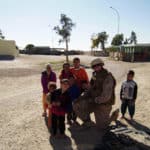Falling through the cracks is not an option for Medical Assisting instructor
 Thirty years in the military have taught Medical Assisting instructor Richard Moriarity a few things about focus, discipline and respect: Three attributes his medical students sometimes scramble to achieve, while they struggle with the demands of their programs.
Thirty years in the military have taught Medical Assisting instructor Richard Moriarity a few things about focus, discipline and respect: Three attributes his medical students sometimes scramble to achieve, while they struggle with the demands of their programs.
“I remind them of the decision they already made to be here,” says Moriarity. “There are a thousand reasons not to attend class, but one very good one to attend, and that’s to have a better life situation.”
SJVC’s medical programs have their unique challenges. “I’ve had people pass out the first time drawing blood,” says Richard, who says he has never let anyone hit the floor. His 6’6″, 225 pound frame is a pretty secure safety net. “But by week four they’re out there just doing it and it doesn’t faze them anymore.”
Richard’s teaching style provides lots of student support, but makes sure responsibility for success rests on those shoulders set on entering the medical field. “I set high standards, and I’m not afraid to tell someone they’re not meeting standards,” he says. “If you have low expectations, they will meet those low expectations. I tell them from Day One, ‘You have to want this more than I want it for you.'”
“Mr. Moriarity is dynamic and engaging in every lesson that he provides to his students,” says Shannon Koh, Academic Dean for SJVC’s Temecula campus. “He is solution-based in every challenge that comes his way and has been instrumental in the success of our MA program.”
His students are in agreement and have bestowed the Apple Award (Teacher of the Quarter) upon him on several occasions.
“The best moments are always graduation, hands down,” says Moriarity. “I’ve seen them struggle, I’ve seen them cry, I’ve seen them think they’re not going to make it,” he says. “When they come out on stage and see the audience and their family…you see it on their face, the transition from the scared Mod 1 person to this confident MA.”
“I just want them to get it, to have a love for medicine, feel they got a good deal and that they are successful in life,” he says. Then, he can let them go with a feeling of accomplishment.
Richard’s students also learn teamwork from watching campus faculty working so well together. “We help each other all the time and students see our interaction, know that this is the way it works here and they feel it’s a good place to be,” he says.
Moriarity’s leadership skills have been honed over the years as he moved through military ranks that began with his enlistment in the Navy and strengthened as he segued into the Marines as an Independent Duty Corpsman (IDC). He learned and then taught young corpsmen the basic medical skills of combat/field medicine and inpatient/outpatient medicine designed to field a medical training battalion.
Richard’s heroes are locked into his consciousness in ways that serve him on every level. “Young Navy Corpsmen and Army medics are out there every day in extreme situations, doing the toughest jobs, taking care of injured and ill Marines/soldiers. That drives me to be a better medical person.”
“I have always wanted to help people, and the military was a way for me to get into that field,” says Richard, who earned his BA degree in Health Sciences and LVN credential along the way. “It turned out to be the best thing I ever did.”
Richard retired from the military as Master Chief, E-9. Only 1 percent of those who join the military – that includes Army, Navy, Marine Corp and Air Force – obtain that rank. But, Richard, his wife Elizabeth, and their three daughters did not have much time to celebrate.
Retirement was just not his thing. Used to a regimented life, panic set in. Richard completed his military career on a Friday and started a new civilian job in the medical field the following Monday. Soon after, a teaching position at SJVC opened up, and Richard felt the connection to helping others learn call out to him.
“I was a typical SJVC student,” he says. “I was finding my way as most young people do in life, when someone took the time to say, ‘Hey, this is how it works.’ It’s like paying it forward; someone made it work for me and I’m helping these young folks find their way.”
You might also like
More stories about
Request Information
All fields using an asterik (*) are required.


